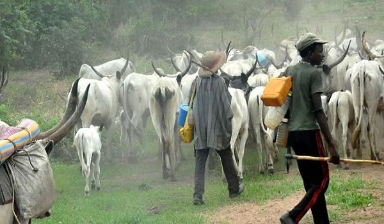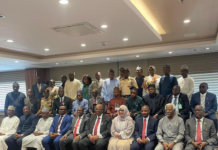The Option between Open Grazing and Ranching By Nafeesat Bello
POLITICS DIGEST – The intractable herders-farmers’ clash has remained unresolved for over a decade and yet the disagreement between the Federal government and some states is exacerbating the situation. Rather than having right measures and approaches to curb the menace, the challenge remains.
The presidency recently criticized the decision of governors of southern states in banning Open Grazing of Cattles and also questioned the rationale behind the decision instead of trying to flex their political muscles.
The Presidential Spokesperson, Garba Shehu said that President Buhari approved a plan that would lead to the permanent solution to the lingering and frequent confrontation between the farmers who are predominantly Christians in the middle-belt and southern states and nomadic herders who are predominantly Fulani Muslims from the north. The violent confrontations between these two warring factions if not contained could metamorphose into ethnic and religious crises. However, the yet unanswered question is what is the plan of the Federal Government to address the issue that results into frequent violent conflicts between farmers and herders in Nigeria?
Some suggestions have been put forward including Ranching and Anti-open Grazing Bill as well as proposed Rural Grazing Area (RUGA) settlement. The RUGA settlement seems to be more beneficial and advantageous whereby the herders and their livestock would be restricted and settled in an organized locality. Such an environment would be provided with basic amenities like schools, hospitals, veterinary clinics, markets and manufacturing entities that would process and add value to meat and animal products. Strangely, however, the proposal was met with fierce resistance as it was criticized and condemned by some host states thereby leading to its premature suspension.
After RUGA settlement was rejected, the National Livestock Transformation Plan (NLTP) was approved in 2019, whose project was expected to provide at least 119 ranches all over the country by 2028. The project was unanimously agreed by the entire 19 northern states and five other states from the south. Unfortunately, up to now, no single ranch has been established across the country.
Read Also:
Meanwhile, the Attorney General of the Federation, Mallam Abubakar Malami had said that the decision to ban open grazing by southern governors is unconstitutional and does not align with the provisions of the Constitution.
Malami said: “It is about constitutionality within the context of the freedoms expressed in our constitution. Can you deny the rights of a Nigerian? Does it hold water for a northern governor to come and state expressly that he now prohibits spare parts trading in the north?”
Immediately after his remarks, the Chairman of the Southern Governors Forum, Mr. Rotimi Akeredolu, SAN, lambasted the justice minister for saying that the ban on open grazing by southern governors was akin to banning spare parts trading in the North. He said “it is most unfortunate that the AGF is unable to distill issues as expected of a senior advocate,’’ adding the ban open grazing is irreversible and will be enforced.
The governor further advised Malami and Federal Government to approach the court to challenge the legality of the laws of the respective states banning open grazing and decision of the Southern Governors Forum taken in the interest of their people. We shall be most willing to meet him in court.”
Meanwhile, ranching is regarded as the most acceptable and most appropriate way to tackle open grazing hence is more beneficial.
Open grazing is an old practice of roaming ruminant animals in open fields, plains and bushes in search of pasture or foliage. The practice has nevertheless, triggered conflicts between famers in host communities and migrant herders. To some extent, banning open grazing may likely reduce the friction and stop the herders/farmers crisis.
There are a lot of advantage in ranching which is the practice of raising cattle and livestock animals in a confined space. Ranching helps in monitoring herds and knowing when cows go into estrus and when they are ready to breed and go ahead with breeding. They are well feed without losing weight by moving from one place to another. They also receive good veterinary care and milking which could be done as at when due in a hygiene and clean manner.
In view of the foregoing, the government at all levels should support ranching and provide logistics to that effect.
Nafeesat Bello
Kubwa, Abuja

















